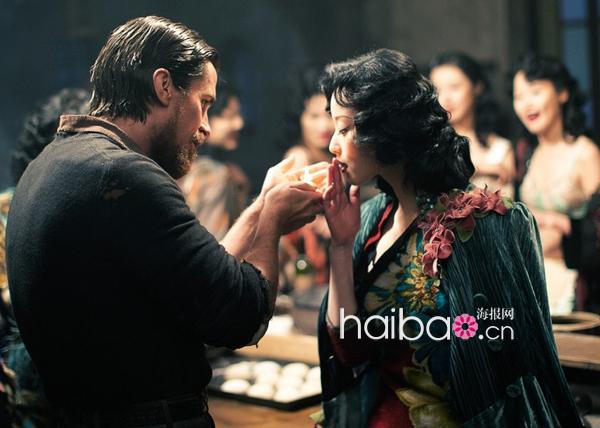'Flowers of War': A dark fairy tale
- By Keen Zhang
 0 Comment(s)
0 Comment(s) Print
Print E-mail
Chna.org.cn, December 17, 2011
E-mail
Chna.org.cn, December 17, 2011
When Zhang Yimou's new war epic "The Flowers of War" finally hit Chinese cinemas Thursday, Zhang soon heard the good news – that the 69th Golden Globes has nominated his latest effort for best foreign language film. The next stop may well be the Academy Awards, as its producers have expected.
Billed as the "most expensive Chinese film ever" and starring Oscar-winning actor Christian Bale and a newbie Chinese actress Ni Ni, "The Flowers of War" takes audiences back to the anguish of the notorious Nanjing Massacre, which took place starting on Dec. 13, 1937.
|
|
|
Christian Bale and Ni Ni in "The Flowers of War." |
Adapted from writer Yan Geling's novel, Zhang's film has something unique to offer, something other directors have not explored yet. Yan herself and Liu Heng reportedly amended their script 56 times.
The Nanjing Massacre and martial arts have always been inevitable subjects for Chinese directors.
Zhang's decision on the former as a feature film subject was made years ago. However, other projects, such as directing Beijing's Olympic Games opening in 2008, delayed his plans for the film.
The story focus on how 14 prostitutes, along with surviving Chinese schoolgirls, hid behind the nominally protective walls of a western cathedral during the Japanese occupation of Nanjing. They are taken care of along by a soldier, one church boy and voluptuary-turned-saint John Miller (Christian Bale), an American mortician who initially comes to Nanjing to bury a priest. To protect the innocent young girls from being raped and killed, the prostitutes sacrifice themselves to satisfy the Japanese soldiers, potentially finding salvation in death.
There is a traditional Chinese saying that "the whore is heartless." But Zhang is trying to prove that a universal value exists: During hard times, even a humblest person can do noble deeds. Humanity can shine through the darkness.
Zhang and his team spent 600 million yuan (US$94.5 million) on making this film powerful and emotional. "The Flowers of War" is a Hollywood-class production, complete with battle scenes, tragedy, sex and raw emotion, themes Zhang has always been good at portraying.
This time around, you may not see the bold flourishes of contrasting colors that were so prominent in Zhang's previous movies such as "Hero" and "Curse of the Golden Flower" and in his Olympic opening ceremony. However, Zhang still uses bright colors to depict certain characters in the film, such as the Nanjing courtesans. Their colorful spirit very much echoes how they are envisioned by Yan in her novel.
Although Bale, Ni Ni and other actors deliver powerful performances, some plots are still unconvincing and sluggish. For example, the love affair between the leading actor and actress is portrayed weakly; as is the-much hyped sex scene, which was repeatedly requested by producer Zhang Weiping. The viewers cannot help but wonder what Ang Lee, who directed "Lust, Caution", would do with the story.
The Nanjing Massacre will forever be a painful memory for Chinese as well as source of inspiration for filmmakers. Lu Chuan's "City of Life and Death," released in 2009, also explored the humanity and terrifying reality of the atrocities which claimed 300,000 lives. Lu also used some fragments from Yan's novel to sustain his own script, such as a Chinese traitor who betrays his country to protect his daughter and struggle to survive the holocaust, but is eventually shot dead.
Lu's somewhat sympathetic stance toward the invading Japanese soldiers sparked controversy and anger upon his film's release. However, Zhang chooses not to elaborate on this subplot on the same level as Lu's film. There is a seemingly educated high-level Japanese officer in "The Flowers of War", but Zhang fails to fully develop the role.
Delicately crafted and artistically produced, "The Flowers of War" ends up being an entertaining but somewhat unconvincing story. The film's look into the unspeakable acts at Nanjing will surely arouse deep emotions among viewers. But the true history of the massacre is even thicker, darker and more desperate that what will appear on the silver screen. Nonetheless, this film, with its depth, beauty and agony, could probably be Zhang's most successful blockbuster film in the past decade.







Go to Forum >>0 Comment(s)